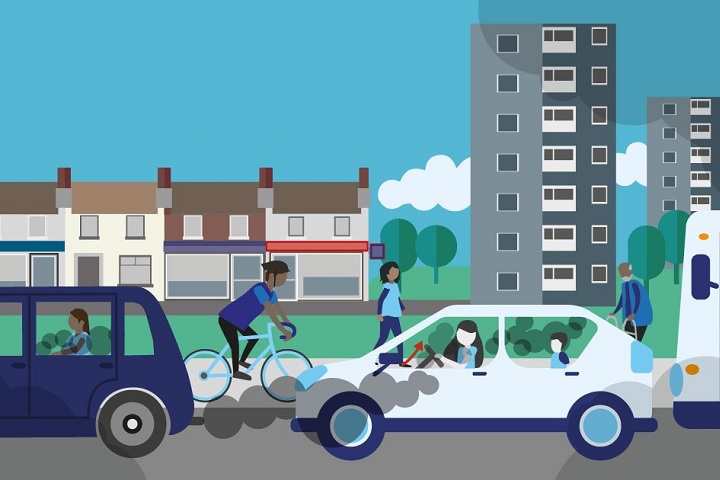
Bristol will become the UK’s first city to ban diesel vehicles, after the city council approved ‘ambitious’ plans.
Part of proposals to improve air quality, diesel vehicles will initially be restricted from entering a central area of the city between 7am and 3pm every day from March 2021.
The council’s plans also include a wider Clean Air Zone – charging buses, taxis and other vehicles that fail to meet emissions standards.
Further measures for tackling air quality include improving and prioritising public transport and the launch of a car scrappage scheme.
The proposals were approved by Bristol City Council on 5 November.
Speaking prior to approval, Marvin Rees, mayor of Bristol, said: “These ambitious plans demonstrate our commitment to tackling air pollution, without disproportionately affecting citizens on lower incomes which would happen with a blanket approach to charging vehicles.
“Protecting the most vulnerable people from pollution is central to these plans and we have ensured that all impacts have been carefully considered.
“If approved, mitigation measures will support those most affected, especially those living in the most deprived communities.”
RAC expresses concern over new congestion problems
Bristol City Council was one of 24 local authorities ordered by the Government to submit a plan for how it will comply with legal limits on nitrogen dioxide (NO2) by March 2021.
While the RAC acknowledges Bristol faces an issue with air quality standards, it has expressed concern over the move to ban diesel vehicles, saying there could be potential problems at this ‘relatively early stage’.
Nicholas Lyes, RAC head of roads policy, said: “Bristol faces the same issues that many other UK cities do – a need to achieve legal compliance with air quality standards in the shortest time possible.
“Major routes into, out of, and even around the city – like Temple Way and Brunel Way – would become out of bounds, with diesel vehicles forced onto other roads, which risks causing congestion problems where they don’t exist at the moment.”
Are the shop owners of Bristol going to be happy with this? I can see many who shop in Bristol at present moving to other shopping areas where they will be more welcome. It is also likely that some of the larger stores relocate outwith Bristol, to other areas of the County where the Bristol Council have no remit, closing their city stores and leaving them to rot.
Derek C Donald, Inverness
+1
What is it worth if you drive a petrol car but take a plane for holiday trips abroad? There is so much more to the air quality debate than petrol v diesel car exhaust emissions.
Guzzi, Newport
+4
The link below provides some information regarding the differences between diesel and petrol vehicles in terms of CO2 emissions and other toxins from these vehicles.
http://theconversation.com/fact-check-are-diesel-cars-really-more-polluting-than-petrol-cars-76241
Philip Blake, Jersey
+3
To date I have had 18 ‘disagrees’ to my comment which started “I’m no expert..” – does that mean I am an expert after all? Or possibly it’s 18 diesel owners.
Hugh Jones
--1
> As a second point, DfT has allowed local authorities to create their own policies.
And yet are the ones forcing local authorities into this situation.
David Weston, Newcastle-upon-Tyne
+3
This is not only a discriminatory policy, but will surely have an effect on the local economy of Bristol. I cannot see how the DfT can allow a local authority to introduce a local policy, whereas diesel cars have some of the lowest car tax rates, but are being blamed for the pollution; the businesses who are being relieved of a responsibility with this policy probably cause so much pollution in other ways. If Bristol were allowed to introduce this policy, then it should allow at least 5 years for diesel car owners to change their vehicles, as those who are not in a position to either pay this tax or change their car, are most at risk.
Kevin Wilcox, Staffordshire
0
This policy if passed would seem discriminatory. The legal case would be very interesting as common sense suggests that a road tax payment to HMG would entitle fair and equitable treatment (in terms of network accessibility) to that enjoyed by other private vehicle owners. Such policies can only be fair if they have long time horizons to allow proper purchase choice.
As a second point, DfT has allowed local authorities to create their own policies. Whilst local thinking and context will always be important the situation we now face is radically different approaches as you travel across the country. That cannot be right.
Peter Whitfield, Liverpool
+7
If councils are wishing to ban vehicles – surely the Council and/or Government should provide diesel vehicle owners with the money to purchase a suitable, like-for-like electric or petrol replacement vehicle?
David Weston, Newcastle-upon-Tyne
+3
I’m no expert, but I’ve always believed that diesels are more polluting than petrol vehicles, so a targeted approach does make sense.
Hugh Jones
--17
Well, that will make it interesting to get to Bristol airport, with vehicles clogging up the narrow country lanes from M5 Gordano services onwards instead.
Not a solution just a displacement of the problem to somewhere else.
Guzzi, Newport
+24